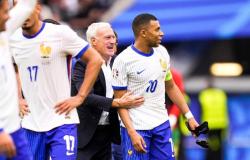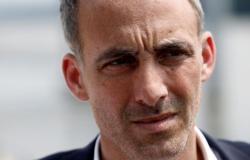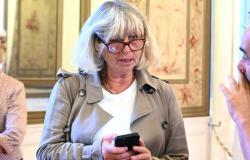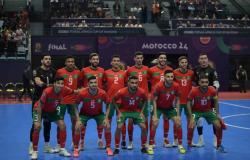“We talk about it a lot, whereas usually, during the festival, we only talk about cinema.” Sophie Mirouze and Arnaud Dumatin, co-general delegates of the La Rochelle Cinema Festival (Fema), arrived from Paris under a blazing sun. Like every year, for a long time, they have just taken up residence at La Coursive. Everything is ready for ten days of intense meetings around 200 films from Europe and elsewhere, 300 screenings, 250 guests… Or almost. Behind the sunglasses reflecting the giant portrait of Michel Piccoli erected on the Old Port, and in a very uncertain political context, we can also hear the concern in the words of the two programmers.
La dissolution. The announcement of the dissolution of the National Assembly by Emmanuel Macron, on the evening of the European elections, also froze the Fema team. “We had returned to normal and we had broken an attendance record last year. All the signals were green. And now, it hits us, we didn’t expect it.” So inevitably, the surprise vote has repercussions on the festival. The two voting weekends fall on the opening and closing weekends (this Sunday and July 7). In terms of ticketing, it is difficult to predict the future, as the festival does not offer a reservation system. The only certainty at this time: the purchase of passes is slightly down. In terms of the effects of the dissolution, the entire team (volunteers, festival-goers, guests, etc.) had to organize themselves urgently to entrust their proxy, when a handful of guests made it known that they wanted to go to the polling booth themselves, thus changing their visit to La Rochelle.
There is real anxiety and the worry will be palpable until July 7”
Catastrophe. Beyond the practical aspect and the consequences on the organization, Sophie Mirouze and Arnaud Dumatin expect the shadow of the legislative elections to loom large during the ten days of the festival. “Yes, it will give a particular color, the climate will be different, less friendly, less light. There is real anxiety and the worry will be palpable until July 7,” they assure in one voice. Free-speaking programmers who do not hesitate to display their convictions. “The election of the National Rally and the appointment of Jordan Bardella as Prime Minister would be a catastrophe for culture, given what they are already doing in the cities where the RN was elected. Culture will be one of the big losers in terms of financial impacts, independence…” comments Arnaud Dumatin.
It is a civic space where we offer to eat and reflect on the world.
Aperture values. Why do we sit in a dark room to look at a work from Kurdistan? Why do festival-goers have the same feeling of being brothers and sisters for a few days? “A film festival is about opening up to others, the opposite of withdrawing into oneself. We come here to meet different cinemas, to exchange ideas. This year, 30 countries are represented. It’s a civic space where we offer to nourish ourselves, to reflect on the world, on history, on the way in which we position ourselves together,” defends the team. The discovery of the “Here and Elsewhere” section, where feature films arrive from Iran, Portugal, Canada and even India, explains the point well.
Accompaniement. A film festival is of course essentially screening sessions. But not only. People also come there to share, exchange, live an exhilarating experience like in a Top 14 forum. “The added value of a festival is the meetings and the support of the works. We invite filmmakers, actors, technicians, editors, screenwriters, etc. “It’s an opportunity to understand how a film is made, its aesthetic, societal and philosophical points of view.” Hence the multiplication of meetings alongside the screenings. This year, for example, the film concert around “Salomé”, a silent film from 1922, set to music by the La Rochelle composer Émile Sornin, will be one of Arnaud Dumatin’s pride. “It’s a way of bringing up to date films that no one sees anymore, of giving them a modern accent. It straddles the line between film projection and live performance. It’s a hybrid work and that’s what’s interesting.” Proof that audacity pays off: the public always comes and fills the rooms, even though they don’t know what awaits them.
Mohammad Rasoulof. The Iranian filmmaker who fled his country a few days before going to Cannes will be present at the Old Port to present “The Seeds of the Wild Fig Tree”. Special Jury Prize, it was the Palme d’Or of many festival-goers, including Sophie Mirouze, who was moved by the film. “An extremely political film about the Iranian regime and the way in which new generations rebel within their families”, summarizes the programmer. Since then, Mohammad Rasoulof has been living in Germany where his daughter is settled. The filmmaker will be present for several days. Beyond an exceptional visit, it is difficult not to see it as a political event, right in the middle of the two rounds.
Francoise Fabian. Among the distinguished guests, Françoise Fabian will certainly not be missed. Fema is paying tribute to her with eight films screened. An actress with Éric Rohmer, Michel Deville and Yves Robert, she will be at the heart of a public meeting hosted by journalist Gérard Lefort on Tuesday, July 2. “She is a rare actress today who has left her mark on generations of film fans, associated with the 1970s and the New Wave. She has played many roles of free, independent women. She is a feminist!” rejoices Sophie Mirouze. “Beautiful and rebellious, a free spirit, an outlaw, who throughout her career has proven that desire has no age,” continues Aurélie Saada, who had her act in “Rose”, screened before the meeting. Some spice and anecdotes in perspective.
Complete program on: festival-larochelle.org






